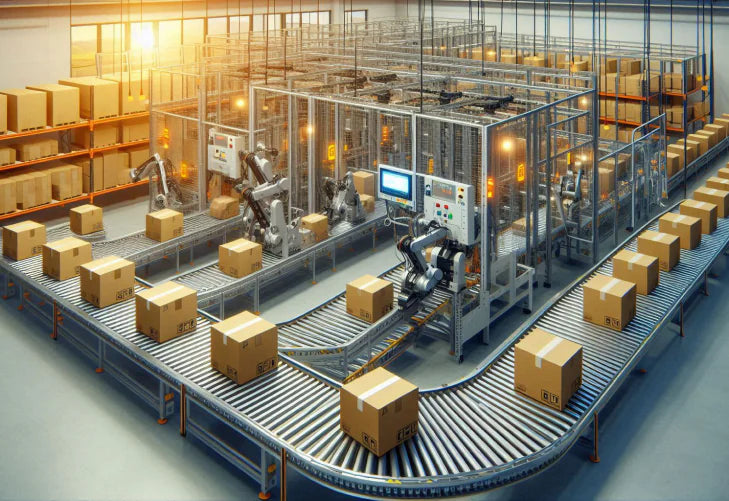
How Kion, Honeywell, and ABB Are Shaping the Future of the Warehouse Automation Market
Share

Introduction
The warehouse automation market is undergoing a transformative evolution, fueled by advances in robotics, artificial intelligence (AI), and integrated systems. This sector is essential for streamlining operations and improving efficiency in logistics, inventory management, order fulfillment, and material handling. From autonomous mobile robots (AMRs) to conveyor systems and warehouse management software, the demand for cutting-edge automation solutions is skyrocketing.
Three leading players—Kion, Honeywell, and ABB—are at the forefront of this market transformation. With significant investments in research and development (R&D) and innovative projects aimed at pushing the boundaries of technology, these companies are laying the foundation for a more efficient, automated, and sustainable warehouse industry.
For investors, these companies represent a significant opportunity to capitalize on the booming warehouse automation market. Let’s take a closer look at how each of these key players is influencing the industry and what that means for future growth.
Kion Group: A Rising Force in Warehouse Automation
Kion Group, a leading global player in warehouse automation, has been consistently investing in R&D to enhance its product offerings. The company’s R&D budget has grown significantly from USD 254 million in 2018 to USD 388 million in 2023, underscoring its commitment to innovation. Kion is focusing on simplifying product ranges, shortening development timelines, and creating tailored solutions to meet customer demands in warehouse automation.
Kion’s innovations are centered on increasing operational efficiency in warehouses, including robotic systems and automated guided vehicles (AGVs). These solutions are critical for industries looking to reduce labor costs, increase throughput, and enhance operational accuracy.
Investor Insight: With Kion’s focus on advancing automation systems, particularly in material handling and order picking, the company is well-positioned to tap into the increasing demand for warehouse efficiency. As e-commerce and logistics companies scale, Kion's technological advancements will play a central role in shaping the future of the market.
Honeywell: Leading the Charge with Interoperability and Innovation
Honeywell International Inc. is a key player in the warehouse automation market, investing strategically in technologies that drive efficiency and interoperability across systems. In 2023, Honeywell spent USD 55 million on development activities aimed at improving automation in warehouse settings. One of its notable advancements is the introduction of the Honeywell Universal Robotics Controller (HURC), a groundbreaking system designed to enhance automation interoperability, allowing different automated systems to work seamlessly together in a warehouse.
Honeywell’s dedication to automation extends beyond robotics; the company is focusing on smart warehouse solutions that integrate AI, data analytics, and Internet of Things (IoT) technologies to enable real-time tracking, monitoring, and optimization of operations.
Investor Insight: Honeywell’s investments in interoperability and AI-driven automation systems position it as a leader in warehouse operations. With continued demand for interconnected and adaptable solutions, Honeywell’s expertise in system integration and robotics makes it an attractive investment in the warehouse automation sector.
ABB: Harnessing AI to Revolutionize Warehouse Robotics
ABB, a global powerhouse in industrial technology, is deeply embedded in the future of warehouse automation. The company is spearheading the integration of generative AI into warehouse operations, with over 100 AI-focused projects currently underway. In particular, ABB’s Robotics division is developing AI-enabled robots capable of integrating vision systems for safe, autonomous warehouse operations.
By leveraging AI, ABB’s robots can not only perform tasks autonomously but also adapt to new environments and learn from their surroundings, improving efficiency and reducing the need for human intervention. This breakthrough technology is poised to revolutionize how warehouses manage their workflows, enabling faster, safer, and more efficient operations.
Investor Insight: ABB’s AI-powered solutions are a game-changer for warehouse automation, addressing the increasing need for smarter, more flexible systems. Investors looking to capitalize on the next wave of technological innovation should consider ABB, as its focus on AI and robotics positions it at the forefront of the industry’s growth.
The Growing Warehouse Automation Market
The warehouse automation sector is witnessing remarkable growth, driven by several factors:
- Robotics and AI advancements: Technologies like autonomous mobile robots (AMRs), robotic arms, and automated guided vehicles (AGVs) are reducing human labor dependency, improving speed, and boosting accuracy.
- E-commerce demand: The boom in online shopping has significantly increased the demand for automated order fulfillment systems to meet the higher volume of inventory management and shipping.
- Integrated systems: Warehouse management software (WMS) and smart solutions are enabling better coordination of robots, conveyors, sortation systems, and inventory management.
In addition to efficiency, warehouse automation is becoming a critical driver of sustainability. By reducing energy consumption, waste, and human error, automation technologies are helping warehouses operate more sustainably, further fueling industry expansion.
Schneider Electric and Omron: Supporting Innovation with Strategic Investments
In addition to the big players like Kion, Honeywell, and ABB, other companies like Schneider Electric and Omron are also contributing to the warehouse automation sector’s expansion. Schneider Electric, with its focus on digitization, AI, and energy efficiency, is positioning itself as a key enabler of the automation movement. Meanwhile, Omron’s investment in 23 startups illustrates its commitment to integrating cutting-edge technologies into warehouse operations, strengthening its market position.
Both companies are tapping into key megatrends, such as digitization, AI, and sustainability, ensuring they stay ahead of the curve as the market evolves.
Conclusion: The Future of Warehouse Automation
The warehouse automation market is not just growing; it is experiencing a revolution in how industries manage inventory, logistics, and fulfillment. Leaders like Kion, Honeywell, and ABB are at the helm of this transformation, driving technological innovations that will shape the future of supply chains worldwide. As these companies continue to invest in AI, robotics, and interoperability, they are poised to dominate the market, creating substantial opportunities for investors.
For investors, this rapidly evolving sector presents numerous opportunities to capitalize on the growing demand for more efficient, flexible, and sustainable warehouse operations. With e-commerce growth showing no signs of slowing down, the need for advanced automation solutions will only continue to increase, making this an exciting time to invest in the warehouse automation space.